Switzerland’s military faces a critical dilemma: 90% of its data seems to be too sensitive for Microsoft’s US cloud, highlighting the tension between the efficiency of a cloud solution and digital sovereignty. This raises questions about whether open-source alternatives can match proprietary solutions, how to balance interoperability with protection from foreign legal jurisdiction (e.g. the (…)
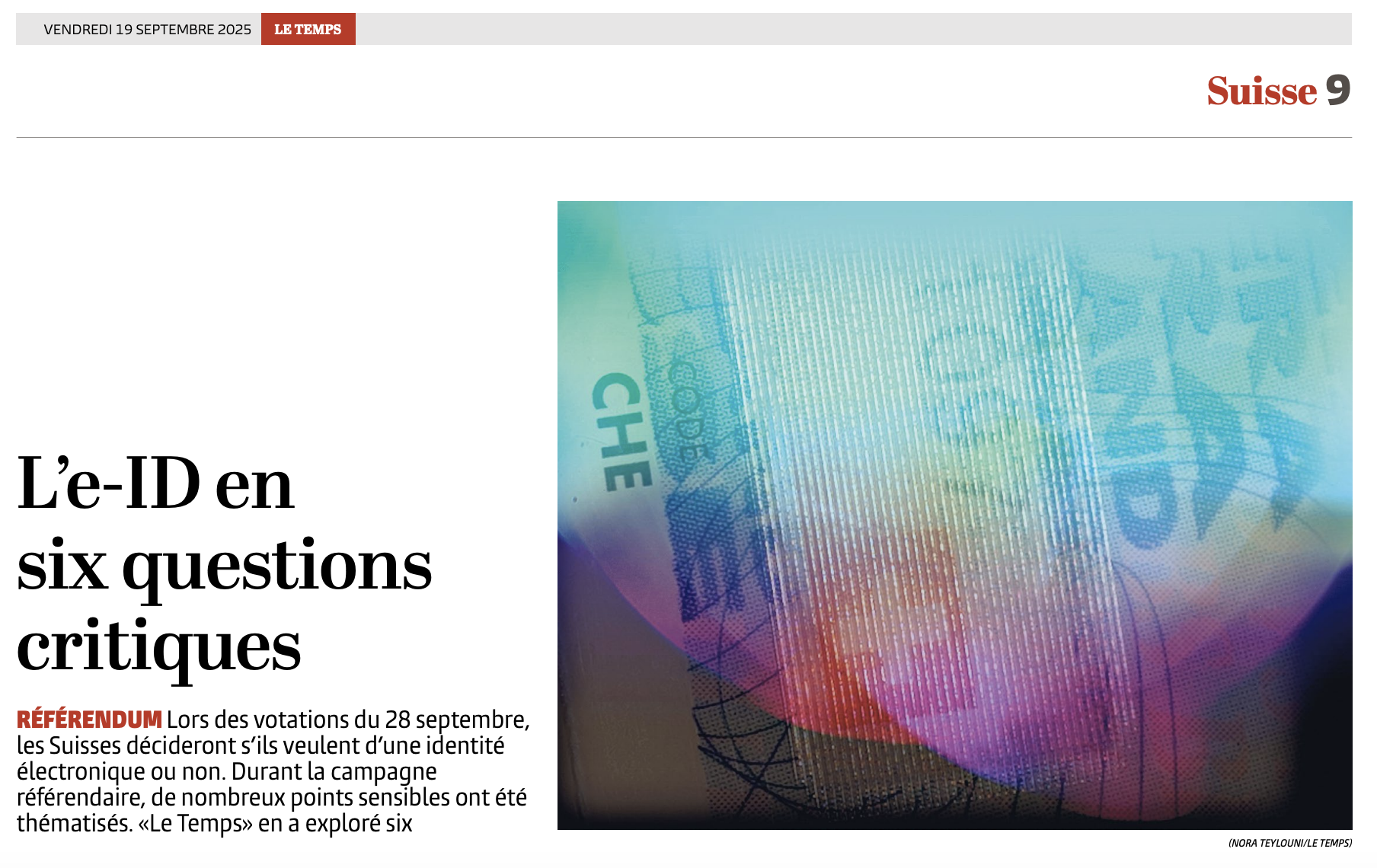
Référendum : Lors des votations du 28 septembre, les Suisses décideront s’ils veulent d’une identité électronique ou non. Durant la campagne référendaire, de nombreux points sensibles ont été thématisés. «Le Temps» en a exploré six.
The author highlights a crucial point that is often neglected by technology experts, entrepreneurs and government authorities alike: how the public understands and feels about this emerging technology. This article captures genuine opinions—optimism, anxiety, and confusion—from people outside the immediate quantum research community.
There has been a lot of discussion about the high cost of cyber-attacks, and the recent announcement that the credentials of Swiss parliamentarians are circulating on the Darknet serves as a reminder of this. Interestingly, stolen access credential is the main intrusion vector (16%) in companies and remains undetected for the longest time (an average (…)
This article highlights the alarming reliance of critical infrastructure on outdated technology, exposing significant vulnerabilities in essential systems. The need for uninterrupted operation and compatibility requirements presents major challenges to the modernization of these legacy systems, and the costs to upgrade are steep. Yet the potential for catastrophic failure due to obsolete equipment underscores the (…)

The Research Institute (SuRI) is an annual event that takes place at the School of Computer and Communication Sciences of the École polytechnique fédérale de Lausanne, Switzerland. The workshop brings together researchers and experts from academia and industry for research talks and informal discussions.
Surveillance of children’s activities is being practiced by schools not only for security reasons but also with the intention of ensuring children’s well-being. On top of that, this article suggests that AI has unencrypted access to students’ activities and discussions. I like this article because it raises important concerns, poses open-ended questions, and sheds light (…)
I always supposed naively that once a breach in a system is detected, it will be fixed in a timely manner. Even more so if it’s in an important system from the government, like the networks used for data gathering of the telecommunication companies. Reality shows that even after many months, the FBI is still (…)
As this real estate agency discovered only in hindsight, ChatGPT hallucinated into existence two schools that don’t even actually exist for one of the agency’s property listings. This serves as yet another reminder for all of us who increasingly rely on tools like ChatGPT that establishing AI trustworthiness remains very much a work in progress.

TLS or Transport Layer Security is the cryptographic protocol that allows your internet connected devices to contact any website or any API or cloud service securely (over HTTPs). It adds privacy to your connection, by encrypting the transferred data, and more importantly helps your computer make sure that it’s talking to the right server, and (…)
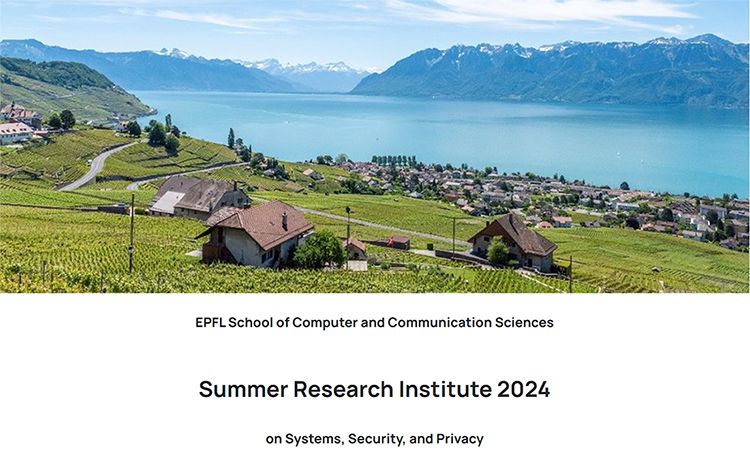
The Research Institute (SuRI) is an annual event that takes place at the School of Computer and Communication Sciences of the École polytechnique fédérale de Lausanne, Switzerland. The workshop brings together researchers and experts from academia and industry for research talks and informal discussions.

International Computing Society Recognizes 2023 Distinguished Members for Significant Achievements, and Mathias Payer, Associate Professor at the HexHive Lab, EPFL, is one of the members!
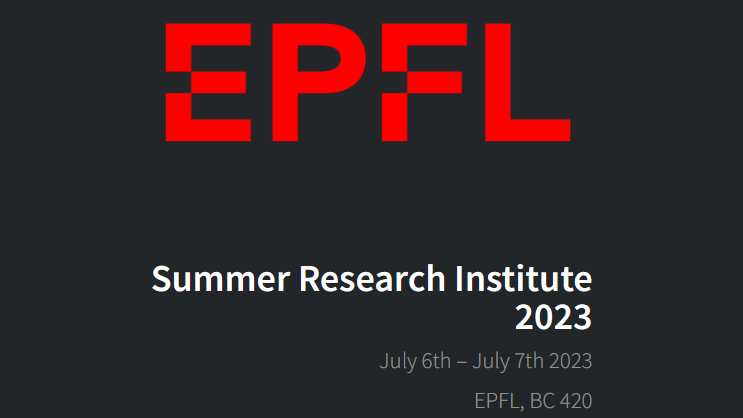
The Summer Research Institute (SuRI) is an annual event that takes place at the School of Computer and Communication Sciences of the École polytechnique fédérale de Lausanne, Switzerland.
This year the workshop will be bringing together 17 researchers and experts from academia and industry for research talks and informal discussions, including a poster session.
Major digestive surgery is associated with a high comorbidity (i.e. high risk of complications after surgery). Anticipating Postoperative complications (POC) may help and guide clinicians in the postoperative management of surgical patients. Unfortunately, the available tools in clinical practice are of restraint value due to their limited accuracy. Recently, artificial intelligence (AI) has shown a meteoric rise in medicine, showing numerous clinical applications but its role to predict POC remains unknown. We aim to use AI to develop new models allowing to improve the prediction of POC in a dataset of >2000 patients undergoing major digestive surgery.
Liver cancer is the second deadliest malignancy. It essentially accounts hepatocellular carcinoma (HCC). Surgery with liver resection is the main curative option but unfortunately, it is only recommended in patients with early HCC. Prognosis of HCC is particularly challenging and results from numerous attempts using various strategies remain relatively poor.Artificial intelligence (AI) has demonstrated unmatched value to decipher complex traits and mechanisms. This multicentric effort will include 8 Academic centers from the United States, Europe and Asia, allowing to generate a large-scale dataset of patients undergoing liver resection for HCC. We aim to investigate the input of AI to improve prognostication of these patients.
Liver cancer ranks third in terms of cancer-related mortality. Hepatocellular carcinoma (HCC) accounts for 90% of primary liver cancers. Tremendous efforts have been pursued to establish HCC prognostic, including clinical, radiological, pathological and even molecular readouts. Regardless of the strategy, the performance of these tools remains modest. Recent data using artificial intelligence (AI) on HCC histology (microscopy) have revealed promising results. We aim to submit pictures of liver cancers specimen to AI models to generate algorithms allowing to establish prognosis in a large-scale study including centers from North America, Europe and Asia.
State-of-the-art architectures for modulation recognition are typically based on deep learning models. However, recently these models have been shown to be quite vulnerable to very small and carefully crafted perturbations, which pose serious questions in terms of safety, security, or performance guarantees at large. While adversarial training can improve the robustness of the network, there is still a large gap between the performance of the model against clean and perturbed samples. Based on recent experiments, the data used during training could be an important factor in the susceptibility of the models. Thus, the objective of this project is to research the effects of proper data selection, cleaning and preprocessing of the samples used during training on robustness.

By 2025 the total amount of data created, captured and consumed is predicted to reach 175 zettabytes. However, much of that data’s value is being wasted due to distrust, as there is fear that the data would be exposed when used, computed on or shared with collaborators, possibly leading to trade secrets being leaked or data protection legislation fines.
I found this nice twitter thread from Vitalik Buterin, the inventor of the Ethereum blockchain: Doing a random twitter experiment just on this day. Only the 268 people I follow can reply to this tweet. Feel free to ask things and I'll talk about anything crypto or non-crypto related. — vitalik.eth (@VitalikButerin) September 1, 2021 (…)
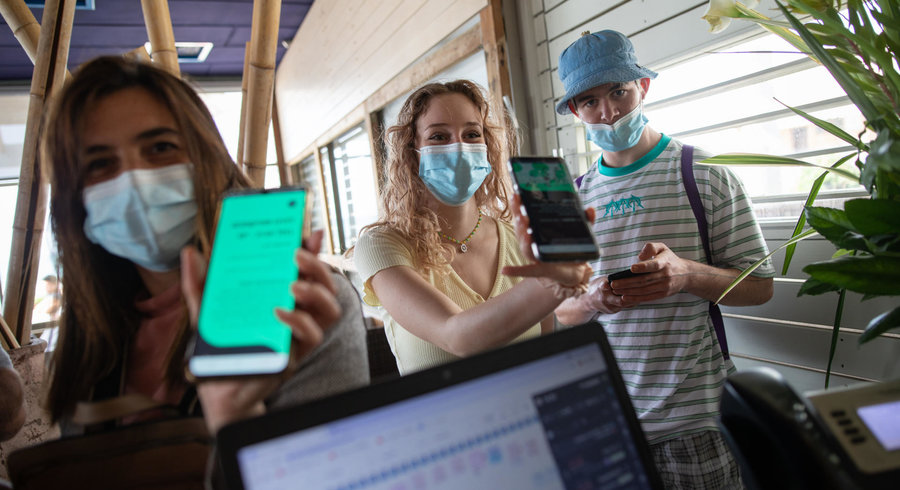
The certificate linked to the virus will not be available before June in Switzerland. Until then, here are twelve answers linked to questions of security, data and accessibility concerning what some call the “Immunity Passport”. In particular, Jean-Pierre Hubaux, C4DT Academic Director, provides insights on the questions linked to data.
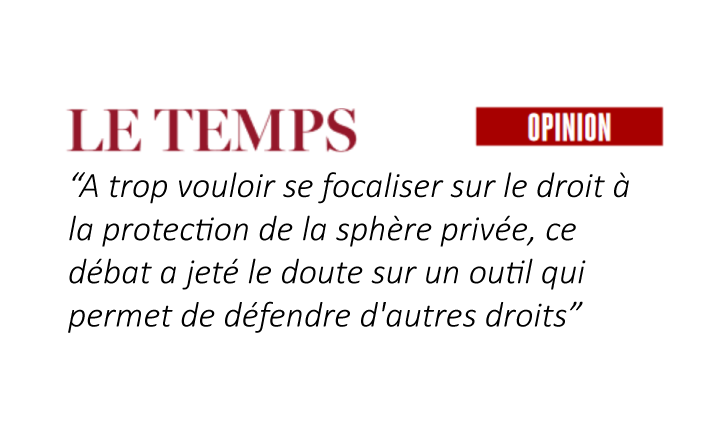
French-language news paper ‘Le Temps’ published an opinion piece by C4DT’s Academic Director and Head of the LDS lab at EPFL, Jean-Pierre Hubaux, on trusting the SwissCovid app. Prof. Hubaux raises the point that the excessive focus on privacy protection has cast doubt on a tool which makes it possible to defend other rights. Read the article in French on ‘www.letemps.ch’ by clicking the following link.
Increasingly, reports warn that state-sponsored actors use social media to spread fake news/disinformation in order to sow distrust and create panic during pandemics and create discord and polarized opinions among people on political issues during democratic elections. Adding to this, social media platforms’ algorithms “add salt to the wound” by feeding their users posts which are aligned with their opinion in order to increase their screen time. How serious and how massive is the problem? What are its implications? And what can/should be done about it?
During this forum, organized jointly by the Center for Digital Trust (C4DT), the CyberPeace Institute and the Graduate Institute’s Centre for Trade and Economic Integration (CTEI) in Geneva, we will discuss not only the technological aspects of this phenomena, but also the regulatory role executive and legislative branches of governments should play. Societal, economical and geopolitical implications will also be debated. This event is open to the general public.
For more information please click below

Following the webinar SwissCovid (DP^3T project) – a proximity-tracing app against COVID-19: building trust in a technology solution organized today by C4DT, the explanations of journalist Marielle Savoy on the question of the population’s support for the Swisscovid application.
Click below to listen to the full report









